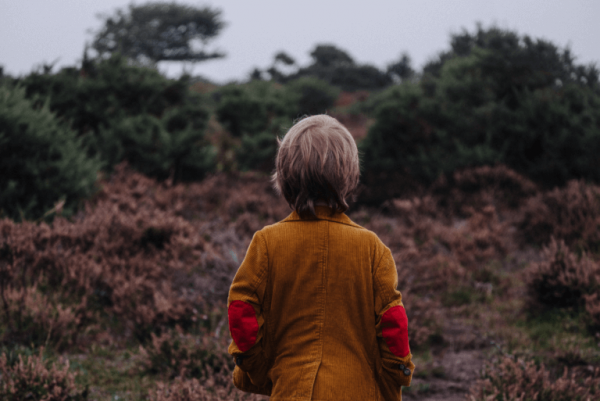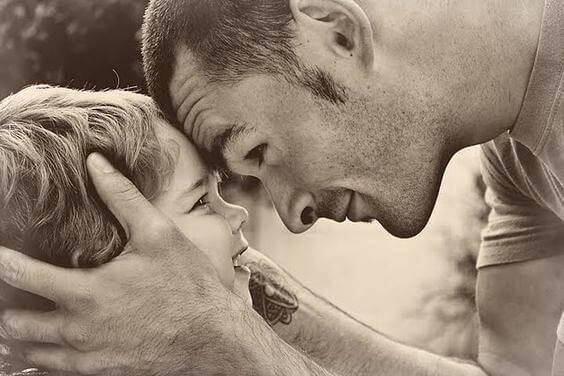How Can I Help My Child If He Has Depression?

Children can suffer depression just like adults can. It is perfectly normal for our children to tell us or show us that they are feeling sad, unhappy, irritated or discouraged for a short period of time. However, depression in children is a very different matter. We have to know how to differentiate between the expression of negative emotions and the presence of an illness.
When negative emotions appear for a child, invading little by little and interfering in different aspects of their life, such as their school performance or family time, they may have depression. Can we, as parents, do anything to help them in this situation? Yes, we certainly can. Keep reading and discover more about depression in children and what to do about it.
“One of the most fortunate things that can happen to you in life is to have a happy childhood”
-Agatha Christie-
How do I know if my child has depression?
Before remedying it, first we have to know if this really is the problem that our little one is suffering from. To do this, we need to be alert to a series of signs that may indicate that he does indeed have depression. But, whatever the case, we will always need to have the diagnosis of a professional.
The signs we should take into account are: irritable or depressed mood, behavior or discipline problems, loss of interest or pleasure, low self-esteem, social isolation, agitation, difficulty concentrating and feelings of worthlessness and despair.

Other worrying symptoms are: a change in appetite, frequent crying, sleep disturbances (both too much or too little), physical complaints, tiredness, weight gain or loss, attempting self-harm, growth and weight not appropriate for the age and development of the child and, last but not least, talking about, or attempting to, commit suicide.
Keep in mind that these circumstances can also be associated with other problems or disorders. This can make it difficult for parents to define whether it is depression or something else. What is clear is that this shows that both we and the child need help. Let’s ask for it!
“I cannot think of any childhood need as strong as a father’s need for protection”
-Sigmund Freud-
Depression in children – What can I do?
Apart from professional help, it is important that, as parents, we do our bit to help our child. For starters, if our little one has low self-esteem and tends to criticize himself, we can praise him and accentuate the positive. In a sincere way of course! We should gently question him in an understanding way about the negative feelings he has about himself, and point out when he projects them onto others.
In depression, there are usually feelings of guilt. When this happens, you should help your child to distinguish between what he can control and what he can’t. If he shows feelings of helplessness or despair, then we should urge him to write down his feelings or to talk about them. He should start the practice of writing down pleasant thoughts about himself 3 or 4 times a day. At first it will be difficult for him, but it is an exercise that will help him to develop healthy feelings about himself.
“It’s never too late to have a happy childhood”
-Tom Robbins-

If we see that he is losing interest in things and showing sadness, then we should organize an interesting daily activity. It’s also worth planning special events and making time to talk regularly about nice family topics. Family life is crucial in all of this. If the family environment is stable, it will help considerably. What do we mean by this? Keeping a routine and reducing changes in the family situation. If there are any changes then we should mention them in advance to try to reduce undue concerns.
And finally, if we observe thoughts or signs related to suicide, then we must go and see a specialist as soon as possible.
In short, it is important to support the child as much as we possibly can, and help them as much as we can. His or her sadness and negative thoughts are important and should be dealt with thoroughly. Depression in children should not be a taboo subject anymore, let’s do our bit to raise awareness.
Images courtesy of Annie Spratt and London Scout.
Children can suffer depression just like adults can. It is perfectly normal for our children to tell us or show us that they are feeling sad, unhappy, irritated or discouraged for a short period of time. However, depression in children is a very different matter. We have to know how to differentiate between the expression of negative emotions and the presence of an illness.
When negative emotions appear for a child, invading little by little and interfering in different aspects of their life, such as their school performance or family time, they may have depression. Can we, as parents, do anything to help them in this situation? Yes, we certainly can. Keep reading and discover more about depression in children and what to do about it.
“One of the most fortunate things that can happen to you in life is to have a happy childhood”
-Agatha Christie-
How do I know if my child has depression?
Before remedying it, first we have to know if this really is the problem that our little one is suffering from. To do this, we need to be alert to a series of signs that may indicate that he does indeed have depression. But, whatever the case, we will always need to have the diagnosis of a professional.
The signs we should take into account are: irritable or depressed mood, behavior or discipline problems, loss of interest or pleasure, low self-esteem, social isolation, agitation, difficulty concentrating and feelings of worthlessness and despair.

Other worrying symptoms are: a change in appetite, frequent crying, sleep disturbances (both too much or too little), physical complaints, tiredness, weight gain or loss, attempting self-harm, growth and weight not appropriate for the age and development of the child and, last but not least, talking about, or attempting to, commit suicide.
Keep in mind that these circumstances can also be associated with other problems or disorders. This can make it difficult for parents to define whether it is depression or something else. What is clear is that this shows that both we and the child need help. Let’s ask for it!
“I cannot think of any childhood need as strong as a father’s need for protection”
-Sigmund Freud-
Depression in children – What can I do?
Apart from professional help, it is important that, as parents, we do our bit to help our child. For starters, if our little one has low self-esteem and tends to criticize himself, we can praise him and accentuate the positive. In a sincere way of course! We should gently question him in an understanding way about the negative feelings he has about himself, and point out when he projects them onto others.
In depression, there are usually feelings of guilt. When this happens, you should help your child to distinguish between what he can control and what he can’t. If he shows feelings of helplessness or despair, then we should urge him to write down his feelings or to talk about them. He should start the practice of writing down pleasant thoughts about himself 3 or 4 times a day. At first it will be difficult for him, but it is an exercise that will help him to develop healthy feelings about himself.
“It’s never too late to have a happy childhood”
-Tom Robbins-

If we see that he is losing interest in things and showing sadness, then we should organize an interesting daily activity. It’s also worth planning special events and making time to talk regularly about nice family topics. Family life is crucial in all of this. If the family environment is stable, it will help considerably. What do we mean by this? Keeping a routine and reducing changes in the family situation. If there are any changes then we should mention them in advance to try to reduce undue concerns.
And finally, if we observe thoughts or signs related to suicide, then we must go and see a specialist as soon as possible.
In short, it is important to support the child as much as we possibly can, and help them as much as we can. His or her sadness and negative thoughts are important and should be dealt with thoroughly. Depression in children should not be a taboo subject anymore, let’s do our bit to raise awareness.
Images courtesy of Annie Spratt and London Scout.
This text is provided for informational purposes only and does not replace consultation with a professional. If in doubt, consult your specialist.







